
October 2019
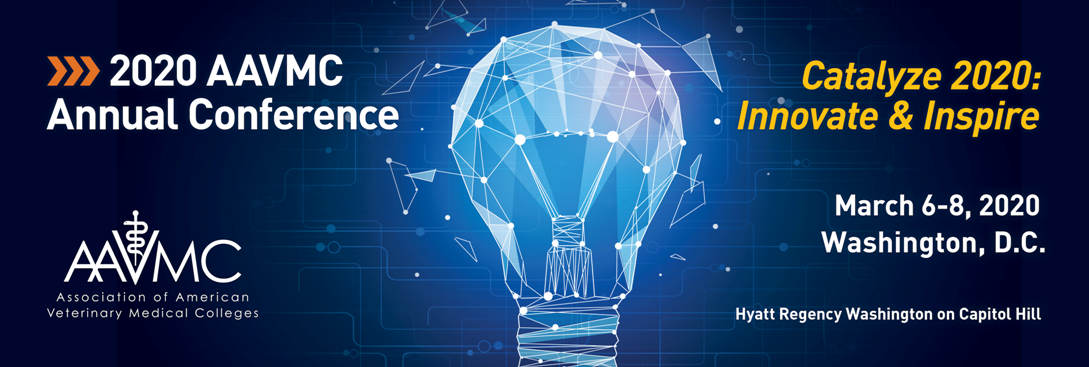
“Catalyze 2020: Innovate and Inspire” Registration Opens Oct.15
Registration opens October 15 for the 2020 AAVMC Annual conference at the Hyatt Regency Washington on Capitol Hill in Washington, D.C. The theme for this year’s conference is “Catalyze 2020: Innovate and Inspire.”The AAVMC’s annual conference is considered one of the leading professional development events in international academic veterinary medicine. Hundreds of educators and other leaders from the veterinary medical profession are expected to gather for the three-day forum.
The AAVMC’s annual complement of recognition awards honoring professional excellence and service will be officially presented during the event.
The AAVMC Board of Directors will meet on March 4, 2020. The event will also feature the annual Advocacy Summit, where leaders share information and build support for academic veterinary medicine on Capitol Hill, on Thursday, March 5. The AAVMC’s annual Veterinary Medical Career Fair will be presented on Sunday, March 8.
Major AAVMC operating committees, including Academic Affairs, Research, Admissions and Recruitment, CIVME and other groups will convene during the days preceding the actual conference. Committee members are invited to consult with AAVMC staff leads for specific information regarding those dates and times. The final component of the AAVMC Leadership Academy will also be held.
Located just steps from the U.S. Capitol building, the Hyatt Regency Washington on Capitol Hill offers easy access to some of the popular Washington D.C. locations.
Please stay tuned to the website for registration information and early registration incentives.
AAVMC, APLU Team up to Present Gene Editing Symposium
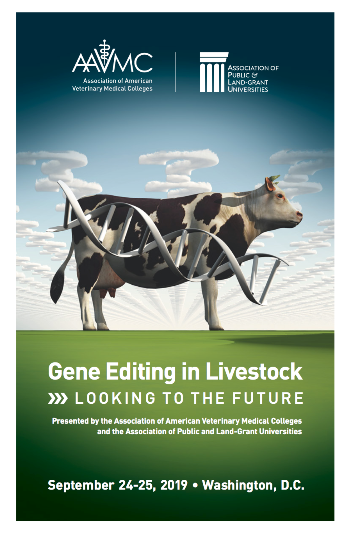 Advancements in biotechnology have now made it possible to manipulate the genomes of agricultural animals and plants in a way that dramatically limits disease and increases productivity.
Advancements in biotechnology have now made it possible to manipulate the genomes of agricultural animals and plants in a way that dramatically limits disease and increases productivity.But ethical questions and appropriate regulatory processes must be fully considered before these technologies can be applied to their full potential. Currently the Food & Drug Administration regulates the genetic modification of food animals as an “animal drug” and the USDA regulates these technologies with crops.
In July, 23 members of the House of Representatives wrote a letter to Acting Commissioner of the Food & Drug Administration Acting Commissioner Norman E. Sharpless asking him to more fully examine current regulatory processes.
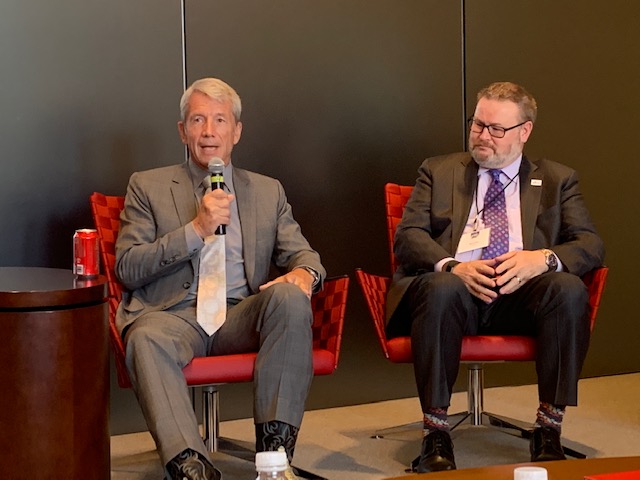
Congressman Kurt Schrader (D-Oregon) addresses the Gene Editing Symposium while AAVMC Governmental Affairs Director Kevin Cain looks on.
That meeting, titled “Gene Editing in Livestock: Looking to the Future,” was held September 24-25 in the main auditorium of the AAVMC’s headquarters building in Washington. A total of 23 of the nation’s leading experts from academia, government, industry, and professional groups convened to examine a series of questions ranging from the nature and safety of this promising technology to its ethical implications.
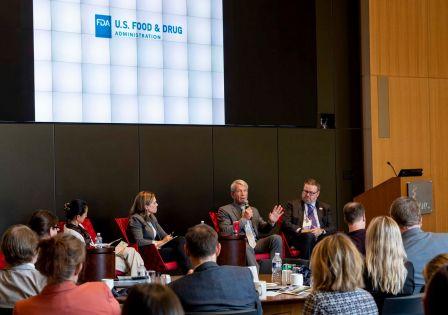 “We took a big step toward developing a regulatory framework that is responsive to many different stakeholders,” said AAVMC Chief Executive Officer Dr. Andrew T. Maccabe. “We were especially pleased with the stature and expertise of the leaders who gathered for this important event.”
“We took a big step toward developing a regulatory framework that is responsive to many different stakeholders,” said AAVMC Chief Executive Officer Dr. Andrew T. Maccabe. “We were especially pleased with the stature and expertise of the leaders who gathered for this important event.”Discussions and presentations held over the day-and-a-half conference explored the many different facets of the gene-editing issue from a public policy perspective. Conference components include Science and Research, Industry Perspective, Bioethics, Public Policy and Regulation, and Communication and Public engagement.
A Conference “Proceedings” is expected to be published. To examine the program and learn more about the people who attended, please click here.
Number of Applicants for 2020 VMCAS Cycle Up Six Percent
 The number of applicants applying to member institutions through the Veterinary Medical College Application Service (VMCAS) continues its steady rise.
The number of applicants applying to member institutions through the Veterinary Medical College Application Service (VMCAS) continues its steady rise.A total of 8,645 students applied for seats during the Class of 2024, a rise of about six percent over last year. A total of 41,722 applications were submitted with, applicants applying to an average of 4.83 schools.
The 2020 application cycle closed on September 17th, and overall, the process ran very efficiently, with no significant problems or concerns reported to the AAVMC or vendor Liaison International by applicants or admissions departments, according to Director of Recruitment and Admissions Diana Dabdub.
These are preliminary numbers are based upon transcript verification, a process which should be completed in October. However, the final numbers historically do not vary much based upon the verification process.
Last year, the number of applicants rose about seven percent over the year before. For the two years prior, a six percent year-over-year increase was noted.
New Director of Admissions and Recruitment Affairs Joins the AAVMC
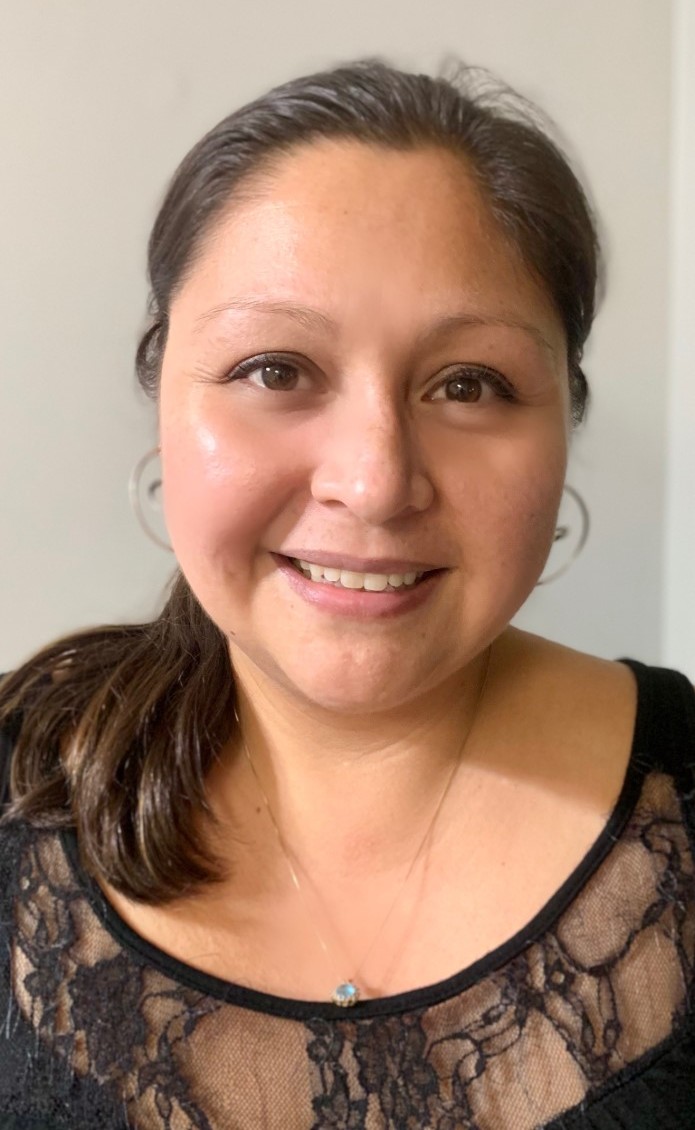 Diana Dabdub is the AAVMC’s new Director of Admissions and Recruitment Affairs.
Diana Dabdub is the AAVMC’s new Director of Admissions and Recruitment Affairs.Dabdub, who assumed her duties on September 16, brings over 19 years of association management experience to her new role. She comes to the AAVMC from the American Society of Health-System Pharmacists (ASHP), where she directed the society’s Pharmacy Student Forum. As the forum’s director, she was responsible for growing the forum’s membership, cultivating the growth and development of student societies and building relationships with faculty at Colleges of Pharmacy.
In her new position, she will develop and implement programs and initiatives related to admissions and recruitment activities at AAVMC member institutions and serve as project manager/staff liaison on special projects that support the AAVMC’s strategic goals. This includes serving as director of the Veterinary Medical College Application Service (VMCAS) and generating admissions and recruitment-related data and reports to support and enhance the activities of AAVMC member institutions.
Dabdub says she hopes to continue the momentum established by former Director of Admissions and Recruitment Affairs Tony Wynne, with continued outreach and enhancements to the VMCAS application system.
“I’m looking forward to using my experience working with members and using that to move veterinary medical school admissions and the entire profession forward,” she said.
Prior to working as forum director, Dabdub held other roles at the ASHP, including that of Membership Program Manager, where she was responsible for managing numerous society member recognition awards programs, member affinity programs, a national student clinical skills competition involving nearly 100 teams from colleges of pharmacy nationwide and serving as the staff secretary to a volunteer member advisory group.
Prior to ASHP, she was the Membership Manager at Community Anti-Drug Coalitions of America (CADCA). She began her career in association management at the Special Libraries Association as the Membership Coordinator.
Dabdub attended the University of Pennsylvania Wharton School of Business, and holds a BS in Economics. She is a member of the American Society of Association Executives (ASAE), member of the ASAE Gold Circle Awards Committee, and was selected as the ASAE Diversity Executive Leadership Program (DELP) Scholar for the class of 2009-2011. In 2016, Diana was selected as a Forty Under 40 Honoree from the Association Forum and USAE.
Evaluating the Depth of Quality in the 2018 AAVMC Applicant Pool
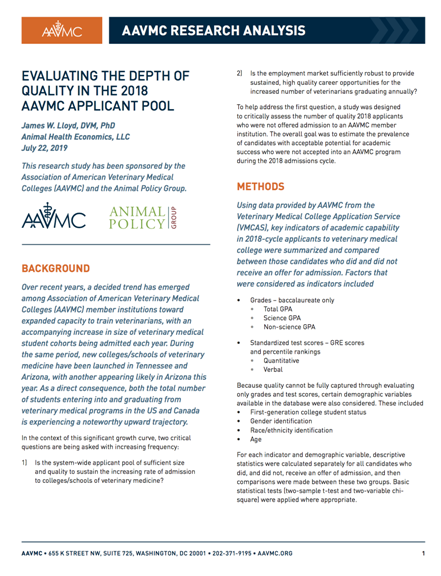 Class sizes in many member institutions have been enlarged in recent years, and new colleges of veterinary medicine have been established in Tennessee and Arizona. As a result, both the total number of incoming students and graduates is on the rise. This has led many to consider several questions. Is the applicant pool of sufficient size and quality to sustain the increased capacity? Is the employment market robust enough to provide high quality career opportunities? How will this affect the compelling need for the profession to increase diversity? The AAVMC and the Animal Policy Group commissioned researcher Dr. James W. Lloyd of Animal Health Economics, LLC to examine the issue. Click here to read his analysis.
Class sizes in many member institutions have been enlarged in recent years, and new colleges of veterinary medicine have been established in Tennessee and Arizona. As a result, both the total number of incoming students and graduates is on the rise. This has led many to consider several questions. Is the applicant pool of sufficient size and quality to sustain the increased capacity? Is the employment market robust enough to provide high quality career opportunities? How will this affect the compelling need for the profession to increase diversity? The AAVMC and the Animal Policy Group commissioned researcher Dr. James W. Lloyd of Animal Health Economics, LLC to examine the issue. Click here to read his analysis.PCVE Symposium Advances Primary Care

More than 80 representatives from 41 veterinary medical schools attended the Primary Care Veterinary Educators Symposium September 12-15 at the Washington State College of Veterinary Medicine in Pullman, Washington.
Topics included presentations on activities underway at several AAVMC institutions in the area of small-animal primary care veterinary education, poster presentations highlighting pedagogical innovation and research in the area of primary care veterinary education, and a Swap Shop designed for sharing best teaching practices, innovations and overcoming challenges.
Conference organizer Dr. Raelynn Farnsworth, Clinical Associate Professor of Veterinary Clinical Science at Washington State, said the PCVE meeting is “the highlight of the year for primary veterinary educators. We are like a family. We have time to collaborate with colleagues that share the same excitement in teaching and the same challenges. We use this collaboration to become energized and bring new ideas home immediately.”
Sessions included a keynote address by Dr. Eleanor Green, dean of the Texas A&M College of Veterinary Medicine, on “Do you Know Who You Are? And What Are You Going to do About It?” as well as a talk on generational differences in learning preferences and a session on building employability for new veterinary medical graduates, with a focus on the VetSet2Go project. VetSet2Go is designed to assist veterinary educators, students and employers with the development and assessment of 18 core capabilities.
A clinical teaching tools carousel, sponsored by industry partners, addressed topics such as how to learn to diagnose and manage feline hypertension, digital tools to prepare students to master nutritional competencies with success, using dental radiology images to help students educate clients, and a Partners for Healthy Pets modular preventive healthcare curriculum.
The symposium was generously supported by Boehringer Ingelheim, IDEXX, the Stanton Foundation and Hill’s Pet Nutrition.
Financial Literacy & Behavioral Change? Not Necessarily Connected
 With escalating concerns about rising educational debt among recent DVM graduates, there are loud calls to increase the levels of financial literacy of DVM students. Colleges of veterinary medicine have created numerous opportunities to help veterinary students learn more about money and debt management. The natural assumption is that greater levels of financial literacy will lead to better financial decision-making in terms of debt acquisition and debt retirement. However, a closer look at the professional literature concerning financial literacy and behavioral change suggests that there is not a direct causal relationship between the two. The AAVMC’s Senior Director for Institutional Research and Diversity developed this Q&A on the topic.
With escalating concerns about rising educational debt among recent DVM graduates, there are loud calls to increase the levels of financial literacy of DVM students. Colleges of veterinary medicine have created numerous opportunities to help veterinary students learn more about money and debt management. The natural assumption is that greater levels of financial literacy will lead to better financial decision-making in terms of debt acquisition and debt retirement. However, a closer look at the professional literature concerning financial literacy and behavioral change suggests that there is not a direct causal relationship between the two. The AAVMC’s Senior Director for Institutional Research and Diversity developed this Q&A on the topic.What is financial literacy?
Researchers have defined financial literacy as more than simply knowing about financial skills and tools. Financial literacy is understood to be the ability to use skills and information to manage money in ways that promote financial well-being. Financial literacy is increased through education programs, usually programming offered with the goal of changing behavior. In the United States, and in many places around the world, financial education is offered at numerous touch points: grade school, post-secondary institutions, prior to major purchases like homes, and preceding retirement.
What do we know about the financial literacy levels of veterinary students?
I hate to burst bubbles, but veterinary students are not unique among peers in their general age cohort. At the AAVMC, we have been studying financial literacy among veterinary school applicants for a number of years, and there is no distinction among knowledge and use of financial tools and use of (or lack thereof) financial planners. A little over 1/3 of applicants report not having had any financial education programming, and nearly 30% report not remembering whether they completed the mandatory financial awareness counseling that is provided for students taking federal student loans. Surprisingly, increases in financial literacy, especially around college aged people, are correlated with increased risky financial decision-making.
That doesn’t make sense. Does an increase in financial literacy actually lead to better decision making?
It depends. Generally speaking, no. It is true that there is a correlative relationship between financial literacy and improved financial behaviors. Unfortunately, the correlation is usually weak and it is not a causal relationship. In extensive meta-studies, researchers Kaiser and Menkoff report that increases in financial literacy are responsible for only .1% of financial behavioral change (2017).
There are numerous reasons why financial education efforts fall short of their goal of creating behavioral change. Many programs are delivered in ineffective ways. This content is best taught in ways that promote active learning, so lectures are not particularly effective. Financial literacy decays over time, and single event programming is ineffective as well. Lastly, timing is everything! Education programs that are not linked to specific events requiring financial decisions are not useful because the learner is not able to act on the new knowledge before it begins to decay.
So, can we actually change financial behaviors?
Yes, it is absolutely possible to positively influence financial behaviors. The key to influencing behavioral change is understanding that people are motivated by more than just knowledge; in fact, knowing better is rarely correlated with doing better!
Financial literacy programs that have been shown to be effective are deadline oriented, short-term programs with a very specific focus and desired activity. So, for example, financial education literature suggests that programming on loan repayment for graduating 4th year students will be far more successful at influencing behavior if provided within 3-6 months of graduation. Conventional wisdom suggests educating around this topic very early on in a student’s academic career, but studies show that such ill-timed programming is predictive of riskier behavior in spending and greater loan amounts. When the programming is focused during a window when it is most relevant and when new graduates can begin to act on the new knowledge, individuals are more likely to make more informed and better decisions about debt management.
Strategically outlining financial decisions that occur throughout the DVM student lifespan, and developing programming to specifically inform each of those decisions at the appropriate time will produce better results than general lecture programming on financial issues associated with the DVM program which are interspersed throughout the curriculum.
Earlier this year, the AAVMC created an infographic that highlights a number of key decisions that pre-applicants through new graduate veterinarians will face. The infographic can be used to help educate around common decisions as well as decisions that do not get enough attention, such as the cost of attending professional, research and leadership meetings while in veterinary school.
Changing financial behaviors requires well focused and timed approaches to be effective.
AAVMC Planning Website Redesign
 Websites are an organization’s digital business card. They project identity, build relationships, and serve as a focal point of connection and information flow. They play a critical role in how an organization relates to its stakeholders. With that in mind, the AAVMC has embarked upon a six-month project to redesign its website.
Websites are an organization’s digital business card. They project identity, build relationships, and serve as a focal point of connection and information flow. They play a critical role in how an organization relates to its stakeholders. With that in mind, the AAVMC has embarked upon a six-month project to redesign its website.“Things happen fast in the world of website design and operations,” said AAVMC Communications Director Jeff Douglas, noting it’s been about 10 years since the AAVMC’s last redesign. “We want to showcase the exciting world of academic veterinary medicine at the same time we provide our stakeholders with simple, clear pathways to the information they seek.”
The AAVMC is working with The Jake Group, an award-winning Washington, D.C. based agency that has experience working with health education associations. The new site is expected to be introduced in Spring 2020.
Douglas and AAVMC Controller and Systems Administrator Mark Stodter are leading the project, with Douglas working on structure and content and Stodter focused on management and operations.
“We’ve established an ambitious, but manageable timeline for this project,” said Stodter. “But I’m confident our team will accomplish the goal.”
Current trends in web design include richer graphics and animations, streamlined content and less information warehousing. Project managers believe much of the content currently residing on the site can be curated and archived in the Higher Logic based “AAVMC Connect” system.
As part of the development process, AAVMC program leaders and volunteers will examine, cull and relocate content based on more than 700 pages of the current site.
Register Now for the 20-19 Veterinary Wellbeing Summit November 17-19, 2019
 The 2019 Veterinary Wellbeing Summit will be held November 17-19, 2019 at the Loews Hotel in Rosemont, Illinois. Themed “Putting the WE in Wellbeing,” the meeting is sponsored by the AVMA, the AAVMC and Zoetis. The meeting will convene academic leaders, educators, students, practitioners, mental health professionals and others to consider the importance of individual and organizational wellbeing on campus and in the workplace.
The 2019 Veterinary Wellbeing Summit will be held November 17-19, 2019 at the Loews Hotel in Rosemont, Illinois. Themed “Putting the WE in Wellbeing,” the meeting is sponsored by the AVMA, the AAVMC and Zoetis. The meeting will convene academic leaders, educators, students, practitioners, mental health professionals and others to consider the importance of individual and organizational wellbeing on campus and in the workplace.
This year’s meeting will feature a presentation from Dr. Christine Moutier, Chief Medical Officer for the American Foundation for Suicide Prevention. Moutier is considered one of the nation’s leading expert in suicide, which affects the veterinary profession at a rate that is substantially higher than the general public.
Topics slated for discussion include:
- Assessing wellbeing across lifestyles and demographics
- How a One Health perspective can reduce veterinary burnout and the risk for suicide
- Understanding how generational differences can impact the team
- Learning how to identify and refer at-risk colleagues
- The intersection of financial health and overall wellbeing
- Organizational and strategic plans for promoting wellbeing
- Vulnerability and letting go of perfectionism
- The importance of diversity and inclusion in creating a work environment that values all members of the team
Please click here more information and registration support.
AAVMC Guidelines for Service Animal Access to Veterinary Teaching Facilities
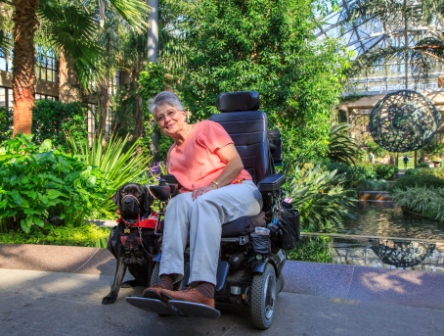 The use of service dogs and emotional support animals to assist people with disabilities has become commonplace. But a lack of standardization in the definition, training and certification of service animals – coupled with regulations codified in law by the Americans with Disabilities Act (ADA) – has created some confusing circumstances. Remember the emotional support peacock denied access to a United Airlines Flight in January 2018?
The use of service dogs and emotional support animals to assist people with disabilities has become commonplace. But a lack of standardization in the definition, training and certification of service animals – coupled with regulations codified in law by the Americans with Disabilities Act (ADA) – has created some confusing circumstances. Remember the emotional support peacock denied access to a United Airlines Flight in January 2018?
An additional level of complication is introduced when these service and support animals are introduced into clinical veterinary medical environments.
Because members of the academic veterinary medical community should be familiar with best – and legal – practices in this area, the AAVMC Board of Directors created a Working Group to study the situation and make recommendations about how service dogs and emotional support animals should be handled in member institution Veterinary Teaching Hospitals.
The board accepted their report and established a series of recommendations. Those can be found here in the “AAVMC Guidelines for Service Animal Access to Veterinary Teaching Facilities.”
AAVMC and Pet Night on Capitol Hill
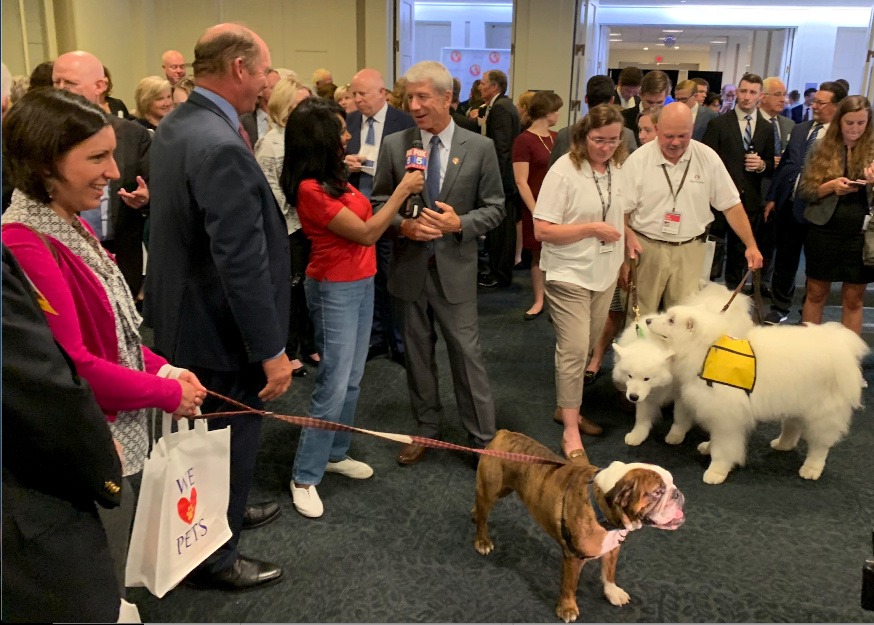
Congressman Schrader is interviewed by a local television reporter while Congressman Yoho looks on.
“Thanks to years of advocacy work conducted by the AAVMC and the AVMA, many members of Congress have developed a greater understanding of the many different reasons why veterinary medicine is such a vital medical profession,” said AAVMC Governmental Affairs Director Kevin Cain. “But many also connect with our profession at a very fundamental level – the love they have for their beloved family pets and the human-animal bond. This event celebrates that.”
Informational exhibits lined the perimeters of the rooms where the event was held, while guests mingled and had a chance to meet several “celebrity” dogs. Those included King, the 2019 Westminster Best in Show winner and Henry, the avalanche search and rescue dog from the movie “Superpower Dogs.”
Kansas Senator Pat Roberts was recognized with the Pet Leadership Council’s “Pet’s Best Friend Award” as a result of his work in passing the Pet and Women’s Safety (PAWS) Act.
The “Cutest Pets on Capitol Hill” contest, which features the pets of Senators, Congressmen and staffers, again proved a crowd-pleaser. Please click here to see the winners.
Hosted by the Human Animal Bond Research Institute (HABRI), the Pet Leadership Council (PLC), and the Pet Food Institute, the event was made possible by many other sponsors, including the AAVMC.
USAID Award Supports New Project Led by UC Davis One Health Institute
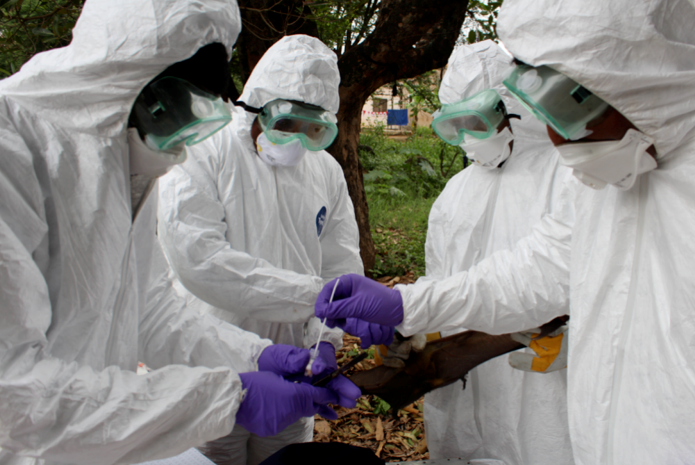 The
One Health Institute at the UC Davis School of Veterinary Medicine,
along with consortium partners, will receive up to $85 million over the
next five years to enhance global health security.
The
One Health Institute at the UC Davis School of Veterinary Medicine,
along with consortium partners, will receive up to $85 million over the
next five years to enhance global health security.The grant, from the U.S. Agency for International Development, is to implement the One Health Workforce—Next Generation project. The project will strengthen the capacity of university networks and their member institutions in Africa and Southeast Asia by developing and delivering sustainable training and programs to quickly respond to disease threats using a One Health approach.
The project takes a transdisciplinary team approach to working across human, animal and environmental sectors, with the goal of building the capacity of national ministries and the private sector to respond to complex health threats that range from antimicrobial resistance to zoonotic diseases.
One Health Workforce—Next Generation consortium members include UC Davis (primary), Columbia University, EcoHealth Alliance, UC Berkeley, UC Irvine, Ata Health Strategies, the University of New Mexico and Sandia National Laboratories.
“We know the One Health approach can help unite professionals in many parts of the world to address complex problems related to human, animal and environmental health,” said Michael Lairmore, dean of the UC Davis School of Veterinary Medicine. “We’re honored at UC Davis to help lead the charge in training the next generation in this essential work.”
Read more.
WVA’s 2020 Global Animal Welfare Award Nominations Deadlines 11/1 and 11/15, 2019
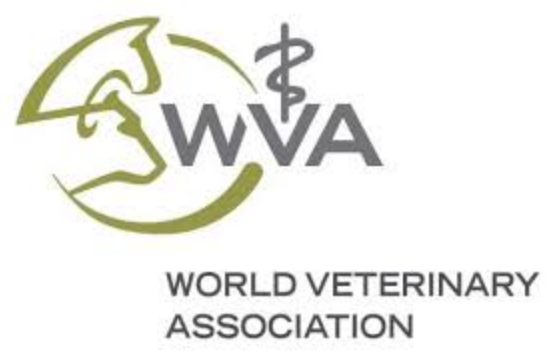 Nominations for the World Veterinary Association’s Global Animal Welfare Awards are now open. The deadline for nomination materials is two-fold: required letters of support from the AVMA must be requested by November 1 and the final nomination materials must be submitted by noon, Belgian time, on November 15.
Nominations for the World Veterinary Association’s Global Animal Welfare Awards are now open. The deadline for nomination materials is two-fold: required letters of support from the AVMA must be requested by November 1 and the final nomination materials must be submitted by noon, Belgian time, on November 15.This global recognition from the WVA and Ceva Santé Animale honors veterinarians, veterinary students, veterinary technicians and schools/colleges of veterinary medicine for their contributions to the protection and welfare of animals and the provision of outstanding and exemplary welfare-related services to animals, animal owners and the public.
Three veterinarians, one veterinary student, one veterinary technician or nurse, and one school or college of veterinary medicine from nominations received from around the world will be selected by the WVA as recipients of the 2020 WVA Animal Welfare Award.
Award recipients will be recognized at a gala presentation on Monday, April 6, 2020, during the 36th World Veterinary Association Congress in Auckland, New Zealand. Travel and accommodation expenses to the Congress will be provided for winners.
For more detailed information about the nomination process, please click here.
Veterinary Debt Initiative (VDI) Round-Up
 Educational debt in the United States is estimated at $1.6 trillion and looms as a significant economic threat for society at large, not just a generation of students. It’s a big problem in academic veterinary medicine as well, but a group of dedicated volunteers are working hard to help. Members of the Veterinary Debt Initiative, comprised of the AVMA, the AAVMC and the Veterinary Medical Association Executives (VMAE), have been meeting regularly for almost two years. Their goal: to help veterinarians thrive in financially sustainable and rewarding careers. Click here to read the newest collection of stories in their periodic roundup.
Educational debt in the United States is estimated at $1.6 trillion and looms as a significant economic threat for society at large, not just a generation of students. It’s a big problem in academic veterinary medicine as well, but a group of dedicated volunteers are working hard to help. Members of the Veterinary Debt Initiative, comprised of the AVMA, the AAVMC and the Veterinary Medical Association Executives (VMAE), have been meeting regularly for almost two years. Their goal: to help veterinarians thrive in financially sustainable and rewarding careers. Click here to read the newest collection of stories in their periodic roundup.
In the News
RCVS Gives Accreditation to Caribbean Vet Schoolvettimes
How I Got into Vet School Without an Undergraduate Degree
DVM360
Zoetis Scholarships Reward Excellence, Leadership
Veterinary Practice News
CVM Breaks Ground on New Farm Animal Veterinary Medical Center
Dairy Business
For Fat Cats, The Struggle Is Real When It Comes To Losing Weight And Keeping It Off
NPR
Developing Therapeutic Strategies for Pregnant Women with Lupus
Microbiome Times
K-State Study Examines Half-life of ASF Virus in Shipped Feed
Feedstuffs
Grant Will Aid in Developing Vaccines to Fight Opioid Addiction
Augusta Free Press
Veterinarians Face Unique Issues That Make Suicide One of the Profession’s Big Worries
TIME
Endocrine-Disrupting Chemicals May Play Role in EMS
The Equine Chronicle
CWD Field Project Earns $900k Grant
Feedstuffs
New Research to Explore Effects of Service Dogs on Children with Autism Spectrum Disorder and Their Caregivers
Stamford Advocate
Texas A&M Researchers Quietly Bred Sick Dogs in Hopes of Finding Human Muscular Dystrophy Cure
Dallas Daily News
Texas Tech University Breaks Ground on School of Veterinary Medicine in Amarillo
MyHighPlains
Pet Ownership Benefits Seniors in Many Ways, Study Finds
Tampa Bay Times
Novel U of S Dachshund Gait Research has Broader Implications for Rehab Medicine
The Star Phoenix
A UMD Researcher is Leading the Charge to Develop a “Universal” Flu Vaccine
Daily Herald
Mississippi Gets $1.25M to Evaluate Spillway Effects on Dolphins, Sea Turtles
WDSU News
Cancer Treatment Progress from Engineering, Veterinary Medicine
Augusta Free Press
This Tufts Veterinary Student Spent the Summer Playing Music for Very Good Dogs to See if it Helped with Short-term Stress
Boston Glode
Veterinarians Battle High Rates of Suicide, Leading UT’s Vet School to Change Programming
WBIR
Veterinary Schools Disproportionately Admit White Students
Veterinary Practice News
RUSVM Amps Up One Health Commitment
Veterinary Practice News
The Veterinarian Will See Your Dinosaur Now
New York Times
Genome-edited Bull Passes Hornless Trait to Calves
Feedstuffs
From Our Members
Whetsel Creates Organization to Help Pets of Domestic Violence VictimsOklahoma State
Why is There a EEE Vaccine for Horses but not for Humans?
Tufts University
New Breakthrough in Creation of Feline Stem Cells Could Help Develop Treatments for Heart Disease in Cats and Humans
Royal Veterinary College
UC Davis Study Reports That Warmblood Fragile Foal Syndrome Is Not Associated With Catastrophic Breakdown In Thoroughbreds
UC Davis
Researchers at U of G Discover Potential Drug to Treat Heart Attacks
University of Guelph
National Humanitarian Medal Awarded to UW School of Veterinary Medicine Alumnus Dold for Work Caring for, Rescuing and Preserving World’s Animals
University of Wisconsin
Dr. Bryan Slinker, Dean of the College of Veterinary Medicine at Washington State University (WSU), has been named as WSU’s Interim Provost and Executive Vice President. His new role begins immediately and extends through June 30, 2020.
Dr. Giselle Hosgood has assumed the role of Interim Principal at the Murdoch University School of Veterinary and Life Sciences in Australia, effective September 25, replacing Dr. Cristy Secombe.
“Like” us on Facebook or follow us on Twitter:




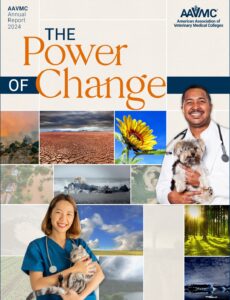
SHARE